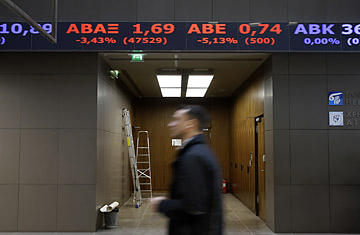
A man walks past a screen showing falling stocks at the Athens Stock Exchange.
For weeks, European leaders have dismissed talk of a bailout for debt-plagued Greece, saying the country could tackle its enormous budget problems on its own. Now, however, as fears of a default domino effect in Europe have shaken global confidence in the euro, the continent's major powers are changing their tune. Suddenly, the question is not, Will Greece need assistance? but, Who is going to help it out and how?
As Europe's less profligate members are realizing, the problem with family is that a good name can be tarnished by a single member's bad behavior. Concern over Greece's public deficit — which now exceeds 12.7% of GDP, well over the E.U. limit of 3% — has sent the euro tumbling and caused stock markets across the continent to fall. And with the finances of eurozone countries now under a market microscope, questions are now being asked about Spain and Portugal, which are also battling high deficits.
The goal now, European officials say, is to try to contain the crisis to keep it from spreading beyond Greece's rocky shores by creating a so-called "firewall" around the country. In Berlin, officials said talks were underway about the possibility of offering loan guarantees to Greece and other heavily indebted eurozone countries, such as Spain and Portugal. Other governments have mentioned the possibility of buying Greek bonds from the primary or secondary markets. Finance ministers from the 16 eurozone countries held an emergency videoconference to discuss how to deal with the situation Wednesday, and the issue was expected to be at the top of the agenda when European Union leaders meet in Brussels on Thursday. Investors are watching closely for any sign of agreement — the euro rose against the dollar Wednesday as it appeared that a bailout might be imminent, then fell following signs from Germany that a plan may not emerge this week.
If a bailout is agreed upon, it would be the first time in the 11-year history of the eurozone this has happened — and there's no rulebook for how it should be done. There's been little agreement so far on the details of a possible rescue plan or even who should take the lead. Some investors think any bailout should be the responsibility of the International Monetary Fund, not other E.U. countries. "A large-scale bailout would make taxpayers across Europe liable, either directly or indirectly, for the mistakes of a government over which they have no democratic control. Such a policy simply isn't reasonable and lacks public support," says Pieter Cleppe, head of the Brussels office of Open Europe, a think tank that opposes greater centralization of power in the E.U. Indeed, the IMF has already given millions in bailout money to E.U. countries like Hungary and Latvia, neither of which uses the euro, but eurozone countries fear that such a move would hurt the reputation of their union on the global stage.
Back in Greece, the economic news is being followed with obsessive intensity. Widows in black are chattering about "the spread" — the premium investors demand to buy Greek debt — while the country's unions are mustering their strength, hoping to show the government they will not accept pay and benefit cuts quietly. Thousands of public sector workers and their supporters took to the drizzly streets of Athens on Wednesday to protest the government's proposed austerity measures, which include a 10% cut on bonuses, which make up a large percentage of many state employees' total wages, and increases in the retirement age for women. A strike organized by Greece's largest public workers' union, ADEDY, also caused schools and government offices to shut and planes to be grounded. "They cannot shift the cost of their mistakes to the working people," said Ilias Vrettakos, vice president of ADEDY. "We will not compromise."
Although polls show that Greek Prime Minister George Papandreou still has broad support for his economic plans, with about 65% of Greeks agreeing that painful measures are necessary to slash the deficit, many of the street protesters said they did not believe the government claims that it had run out of money. Others argued that it was the rich who should pay. "It's a crisis caused by the capitalist system," said Sissy Vovou, a 60-year-old pensioner. "Those who should pay are the capitalists, not the working classes."
Papandreou's government is walking a difficult line. It's been trying to convince its European partners — as well as the global markets — that it is taking serious steps to cut state spending and tackle its deficit without causing civil unrest at home. But the choice may soon be out of Greece's hands, and Papandreou must know that any outside assistance is likely to come with strings attached.
